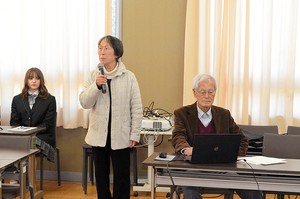Vox Populi, Vox Dei is a daily column that runs on Page 1 of The Asahi Shimbun.
August 31, 2022 at 12:18 JST
 The Jialing River, a major tributary of the Yangtze River, is dried up amid a drought on Aug. 25 in Chongqing, China (Ryo Inoue)
The Jialing River, a major tributary of the Yangtze River, is dried up amid a drought on Aug. 25 in Chongqing, China (Ryo Inoue)
Author Ryunosuke Akutagawa (1892-1927) observed that, “The Yangtze River is wide, but it is not a sea,” in his “Choko Yuuki” (Travels on the Yangtze) when he traveled up this river, which runs east and west across China.
The ship Akutagawa used “cut through the water, proceeding westward in a leisurely manner.” It encountered a few large rafts sailing downriver. They had roofs like houseboats, and the owners kept pigs.
Akutagawa also claims to have seen a U.S. gunboat. The Yangtze River was so wide it could indeed be almost mistaken for a sea.
But where has this brimming river gone? There are daily reports of drought along the Yangtze River basin.
The Asahi Shimbun recently carried a photo of a dried-up tributary, revealing its cracked riverbed. In the prolonged heat wave, rainfall along the Yangtze River is said to be only half its normal levels, hampering hydroelectric power generation.
The resultant power shortage has hit a number of cities, including the major metropolis of Chongqing.
Even with the mercury topping 40 degrees, you can’t turn on the air conditioner--the epitome of brutal. People have been forced to seek “refuge” in subway stations.
Crop failure due to the prolonged drought is also a concern.
It has been pointed out that this extreme weather is being caused by La Nina and global warming.
Japan fears summer floods caused by global warming. In China, too, a series of floods occurred along the Yangtze River in the summer of 2020.
And now, the switch from flooding to drought reminds us anew that natural disasters have many faces.
The word “kanbatsu,” which means drought in Japanese, was originally written with a kanji that stood for the god of drought in ancient Chinese mythology. And in one mythical tale, there is a scene where this god fights the gods of wind and rain to decide the weather.
I pray these gods will go easy on the use of their awesome powers.
--The Asahi Shimbun, Aug. 31
* * *
Vox Populi, Vox Dei is a popular daily column that takes up a wide range of topics, including culture, arts and social trends and developments. Written by veteran Asahi Shimbun writers, the column provides useful perspectives on and insights into contemporary Japan and its culture.




















A peek through the music industry’s curtain at the producers who harnessed social media to help their idols go global.
A series based on diplomatic documents declassified by Japan’s Foreign Ministry
Here is a collection of first-hand accounts by “hibakusha” atomic bomb survivors.
Cooking experts, chefs and others involved in the field of food introduce their special recipes intertwined with their paths in life.
A series about Japanese-Americans and their memories of World War II